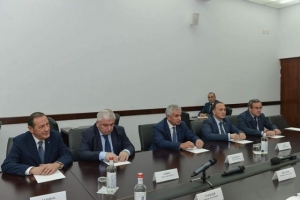De-Facto Leaders of Georgian Occupied Territories Meet in South Ossetia
Op-Ed
Recently, the de facto leaders of the two Georgian occupied territories met each other in South Ossetia. Anatoly Bibilov made a big deal out of Raul Khajimba’s visit, and hosted him over a two-day period. The occupied borders in Akhalgori, as well as other villages surrounding South-Ossetia, were closed specifically for the event. Almost all active institutions, from educational to police, have shifted to work in a specific mode in order to ensure the safety of the ‘VIP’ guest. Obviously, all the fuss was due to the event that occurred during Bibilov’s last visit to Abkhazia some three-month ago, on July 6 he almost ended up in a car accident. No injuries were sustained; however, the incident apparently had some influence on other developments between the two de-facto governments.
Prior to Khajimba’s visit, negotiations between the occupied regions were held in Geneva, where representatives from the occupied South-Ossetia discussed the increase in numbers of animal pandemic diseases, previously uncommon to the region. The possible reasons stated were the Lugari Laboratory of Tbilisi and the laboratory by the Sokhumi Monkey Nursery. The Russian narrative about the Lugari Laboratory voiced in Geneva by South-Ossetians isn’t new. However, the statement that the Sokhumi laboratory also posed a threat was quite surprising, especially for the so-called officials from de facto Sokhumi.
Bibilov had offer an explanation about this recent impromptu visit, but at the end of Khajimba’s visit, they signed a Memorandum of Cooperation about livestock and agriculture. Presumably, the term livestock in this case also included monkeys. Apart from the biological exotica, Khajimba’s visit was important in terms of yet one more issue, asking Bibilov to pardon Georgian prisoner Giorgi Giunashvili and hand him over to Georgia. The request was fulfilled right away.
Media in South-Ossetia evaluated this act as the goodwill of the president of the de facto republic. Zurab Lakerbaia, representative of the Abkhazian de-facto Government, handed over Giunashvili to the Georgian side on the Ergneti check point. Murat Jioev, representative of de facto South Ossetian President Anatoly Bibilov, confirmed that Giunashvili was pardoned by Bibilov at the request of Khajimba, saying that the act represented the “Goodwill of South Ossetia and humanity of the President.” Jioev added that the pardon and transfer of a Georgian convict was an action that reiterated Bibilob’s respect, as he needed to exchange the prisoner for an Abkhazian convict serving his sentence in Tbilisi. The identity of the citizen who was supposed to be pardoned in exchange for Giunashvili is unknown.
An interesting fact to remember is the exchange of prisoners that took place on the Enguri Bridge in 2016, Sokhumi and Tbilisi called this an exchange a person for a person. Therefore, calling Khajimba’s pardon just “goodwill” raises many questions. If every prisoner convicted in Tbilisi has already been exchanged for every convict serving their sentence in Abkhazia, then who was Giunashvili exchanged for? South-Ossetian regimen had convicted Giunashvili with charges of terrorism, and not simply the illegal violation of the border control, hence it is quite possible that the unknown Abkhazian prisoner in Tbilisi might also be convicted with the same charges. Although the State Minister for Reconciliation and Civic Equality Ketevan Tsikhelashvili denies these allegations and agrees that the pardon was merely a pragmatic-humanistic decision from Tskhinvali, we still tend to question Khajimba’s morals, especially when he himself mentioned the exchange. Now all we need to find out is who the Abkhazian prisoner is. Obviously, it is somebody important, and hopefully he doesn’t turn out to be another Shkrilnikov or Chataev.
By Zaza Jgarkava












